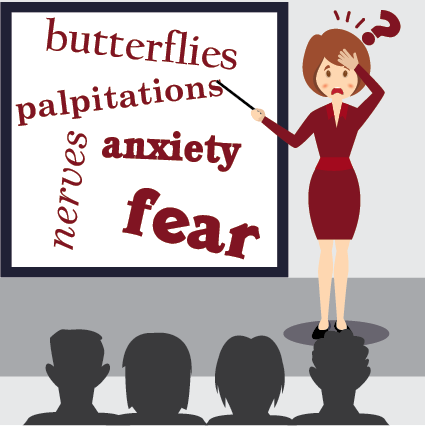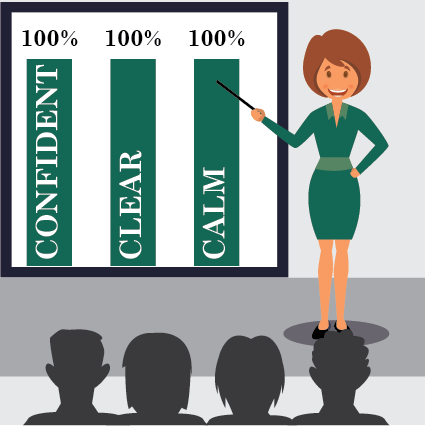
As soon as you read the title, you probably reacted to it. You might have felt offended or angry that I would even suggest such a thing. You might have said to yourself something along the following lines: ‘of course I am afraid of public speaking, I can feel it.’
My aim is not to upset you. I just want to help you realise that what you think of as ‘fear of public speaking’, is not what you think it is.
I do understand the feeling you experience, as I experienced something similar, when I had to read out loud. It is because this feeling, which you call fear, was not related to public speaking that I had an insight into this subject.
I’m hoping this article will help you have an insight too and when you do, you will feel differently about public speaking in future, as many of my clients do.
I will address the three areas involved in turn; fear, the public and a speaker
I’ll begin with fear

Fear is the feeling you would have if you were suddenly in the presence of a lion. Your heart starts racing as you consider what action you can take in order to avoid the danger: fight, flee or freeze. You might also start sweating, breathing faster and have butterflies in your stomach. This is a reflex reaction to real danger which happens at the point when the event is happening. Therefore in the present moment.
Yet the Collins dictionary defines fear as: “an unpleasant feeling you have when you think you are in danger”.
I will come back to that at the end.
For now I would like explore the public.
An audience is made up of a person just like you, sitting next to another person just like you and so on.
If like many, you are comfortable with an audience of two or three people, you might want to ask yourself, at what point does and extra person sat next to another become too many? Why does that one extra person matter so much?
If you were in an audience now, how would you respond to a speaker. Even a bad one. These days even tomato throwing is not very likely. Are you likely to put the speaker in any danger? I think not. So why does the public seem such a threat to a speaker? In most cases unless you are famous, your life is not likely to be in real danger from public speaking.
So is the audience really a problem?
Finally the issue of the speaker
If you consider what you are scared off and rationalise it, as we’ve just done, you realise that it does not make sense. You will also notice that it doesn’t change your fear.
That is because fear is a feeling, an emotion and you can’t rationalise emotions. If you doubt me have a go at explaining falling in love to a 5 year old!
As Blaise Pascal put it: “Le coeur a ses raisons que la raison n’a pas”. Which I translate as: “The heart has its reasons, which reason knows not”
I wondered why I was not afraid of public speaking but was, of reading. That led me to the realisation that most people associate fear with an audience, but my experience of being the centre of attention in front of an audience was probably very different to that of many.
From age 5 to 18, every 2 years, I would perform, usually gymnastics (the one subject I could be almost sure to get top mark in) for the thousands of parents, students and visitors, to the weekend long events, to showcase the school. The result …. applause. In my teens I also performed a play for which I won a prize. So my association with having an audience was a good one.
However Reading was a different matter. When I had to read out loud in primary school, I would just read slowly, painfully in a monotone voice one word after another, with no sense of punctuation. When I would sit back down, I had no idea of the meaning of what I had read. I was ridiculed, called a slug, a snail and a tortoise and got poor marks. Therefore, my association with reading was poor and I avoided it like the plague and hated reading altogether.
It was not till I studied psychology that I suspected I was dyslexic. This did not immediately change my experience then, nor what happened to my body when I thought about reading now, but it changed :
– how I felt about what had happened.
– and how I felt about myself in that context
– but more importantly it changed the beliefs I held about myself and my abilities.
I realised that reading brought back that same a sense of vulnerability I had as a child and that delayed me taking action, fleeing or freezing. This is what tends to perpetuate the feeling, to the point we think it is fear of something that is stopping us. When in fact it is our own sense of vulnerability and avoidance of it that is.
Back to thinking
Chances are like me, you can recall the first time you experienced the feeling that you think of as ‘fear of public speaking’. But the feeling came after you had that very first bad experience not before the event happened.
As the definition states fear is: “an unpleasant feeling you have when you think you are in danger”. Think being the operative word.
What is happening is that having had that bad experience, you think the same situation will happen again. You are therefore casting your mind forward. This means you are now experiencing the feeling before anything has actually happened. You are not in the present but in the future.

The way I like to describe it to clients, is: the first time you actually saw a real lion. Now what you’re seeing is a picture of the lion or imagining one. Once you recognise that all you have is an image, there is no longer anything to be afraid of. This is vulnerability, not fear as we have ascertained earlier the public is no danger.
I do hope this has helped you understand that you are not afraid of public speaking. What is really at play is; the thought you have about the connection you have made between a situation and a feeling. So it is neither the speaking, nor the public, nor the fear, nor being in danger that are the problem. Your thoughts about yourself in the situation are!
As René Descartes would say: ” Except our own thoughts, there is nothing absolutely in our power.”

If you can allow yourself to stay PRESENT, feel vulnerable and express what you are really feeling, accept yourself for who and what you are, with all you foibles and imperfections, then your thoughts and feelings will change. Just as mine did eventually, as I can now relish reading to my son at bed time.
In case you haven’t already seen it, here is more about vulnerability from Brené Brown’s Ted talk.
